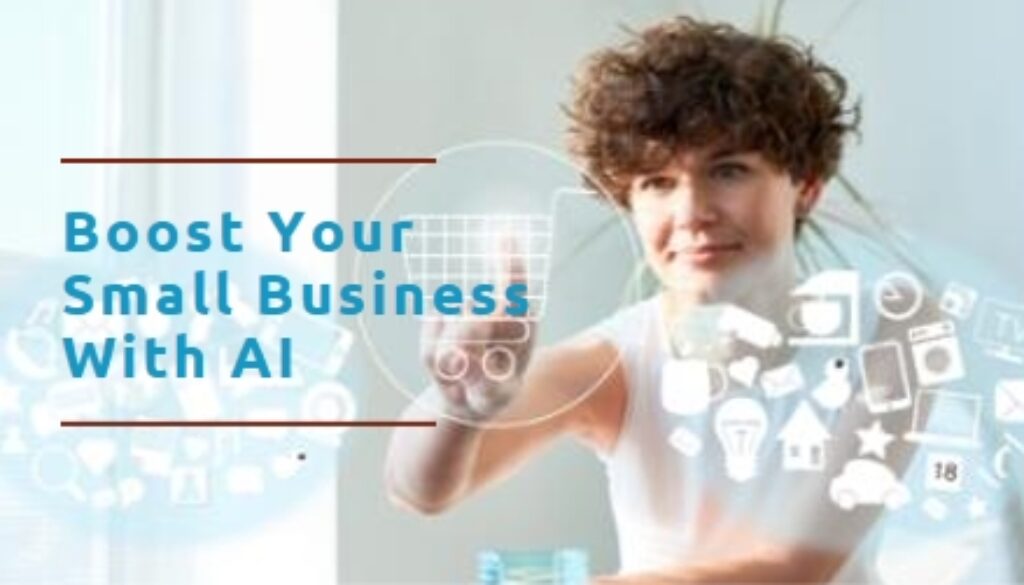Boost Your Small Business with AI Technology
Boost Your Small Business with AI Technology
Discover how AI can revolutionize your small business growth and success. Unlock its potential today! Artificial intelligence (AI) is not just a buzzword or a futuristic concept. It is a powerful technology that can help small businesses improve their operations, customer experience, and profitability. In this blog post, we will explore some of the ways that AI can benefit your small business and how you can get started with it.
What is AI and how does it work?
AI is the ability of machines to perform tasks that normally require human intelligence, such as understanding language, recognizing images, making decisions, and learning from data. AI works by using algorithms, which are sets of rules or instructions that tell the machine how to solve a problem or achieve a goal. AI can also use data, which are pieces of information that the machine can process and learn from.
There are different types of AI to help boost your small business, such as:
- Machine learning, which is the process of teaching machines to learn from data and improve their performance without explicit programming.
- Natural language processing, which is the ability of machines to understand and generate natural language, such as speech and text.
- Computer vision, which is the ability of machines to perceive and interpret visual information, such as images and videos.
- Deep learning, which is a subset of machine learning that uses multiple layers of artificial neural networks, which are mathematical models that mimic the structure and function of the human brain.
What are the benefits of AI for small businesses?
AI can help small businesses in many ways, such as:
- Enhancing customer service. AI can help you provide faster, more personalized, and more convenient customer service, by using chatbots, voice assistants, sentiment analysis, and recommendation systems. Chatbots and voice assistants can answer common questions, provide information, and handle simple tasks, such as booking appointments, placing orders, or making payments. Sentiment analysis can help you understand the emotions and opinions of your customers, by analyzing their feedback, reviews, and social media posts. Recommendation systems can help you offer relevant and tailored products, services, or content to your customers, by analyzing their preferences, behavior, and history.
- Improving marketing and sales. AI can help you optimize your marketing and sales strategies, by using predictive analytics, lead generation, and personalization. Predictive analytics can help you forecast customer demand, identify market trends, and measure the effectiveness of your campaigns, by using data and statistics. Lead generation can help you find and attract potential customers, by using data mining, web scraping, and social media analysis. Personalization can help you create and deliver customized messages, offers, and experiences to your customers, by using segmentation, targeting, and dynamic content.
- Boosting productivity and efficiency. AI can help you automate and streamline your business processes, by using robotics, process automation, and data analysis. Robotics can help you perform physical tasks, such as manufacturing, packaging, or delivery, by using machines, sensors, and actuators. Process automation can help you perform digital tasks, such as data entry, invoicing, or reporting, by using software, bots, and scripts. Data analysis can help you make better and faster decisions, by using dashboards, visualizations, and insights.
How can you get started with AI for your small business?
AI may seem complex and expensive, but it is actually accessible and affordable for small businesses, thanks to the availability of cloud computing, open-source software, and online platforms. Here are some steps that you can take to get started with AI for your small business:
- Define your goals and challenges. Before you invest in AI, you need to have a clear idea of what you want to achieve and what problems you want to solve with it. You can start by identifying your pain points, opportunities, and objectives, and then prioritize them according to their impact and feasibility.
- Choose the right tools and solutions. Once you have your goals and challenges defined, you need to find the best tools and solutions that can help you implement AI for your small business. You can choose from a variety of options, such as:
- Cloud services, which are online platforms that provide access to AI capabilities, such as machine learning, natural language processing, computer vision, and deep learning, without requiring you to install or maintain any hardware or software. Some examples of cloud services are Google Cloud AI, Amazon Web Services AI, Microsoft Azure AI, and IBM Watson.
- Open-source software, which are free and publicly available programs that allow you to create and customize your own AI applications, by using code, libraries, and frameworks. Some examples of open-source software are TensorFlow, PyTorch, Scikit-learn, and NLTK.
- Online platforms, which are websites or apps that offer ready-made AI solutions, such as chatbots, voice assistants, sentiment analysis, and recommendation systems, without requiring you to have any technical skills or knowledge. Some examples of online platforms are Dialogflow, Rasa, MonkeyLearn, and Recombee.
- Test and evaluate your results. After you have chosen and implemented your AI tools and solutions, you need to test and evaluate their performance and outcomes, by using metrics, feedback, and experiments. You can use metrics, such as accuracy, speed, and cost, to measure how well your AI tools and solutions are working and compare them with your baseline or benchmarks. You can use feedback, such as surveys, ratings, and reviews, to understand how your customers and employees are satisfied and engaged with your AI tools and solutions. You can use experiments, such as A/B testing, to compare different versions or variations of your AI tools and solutions and find the optimal one.
My Business Web Space may earn an Affiliate Commission if you purchase something through recommended links in this article.
Discover more from My Business Web Space
Subscribe to get the latest posts sent to your email.

